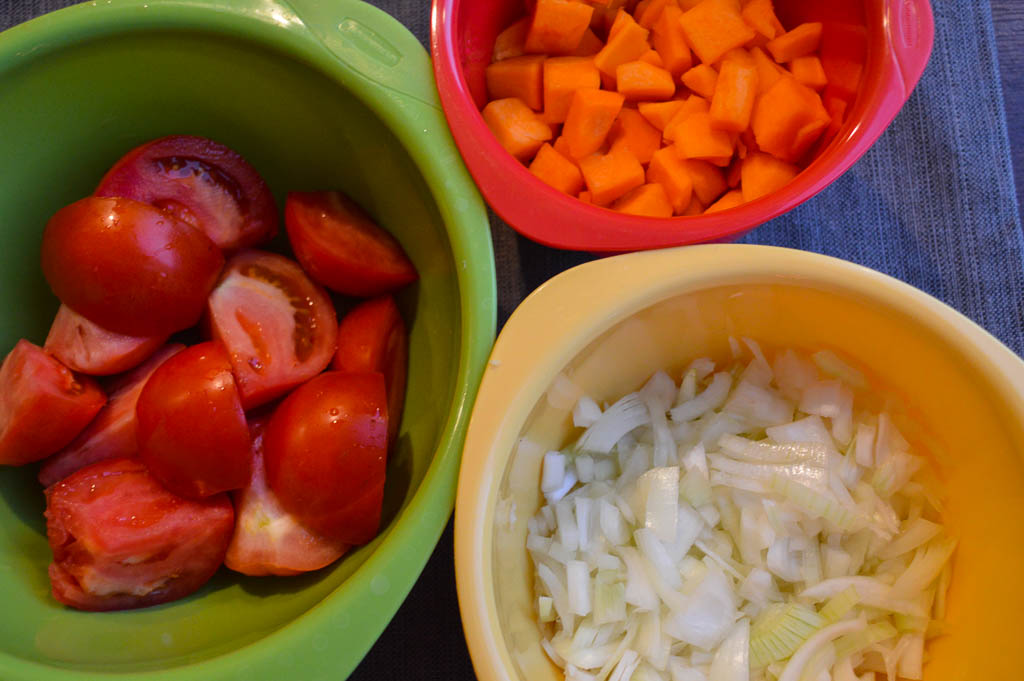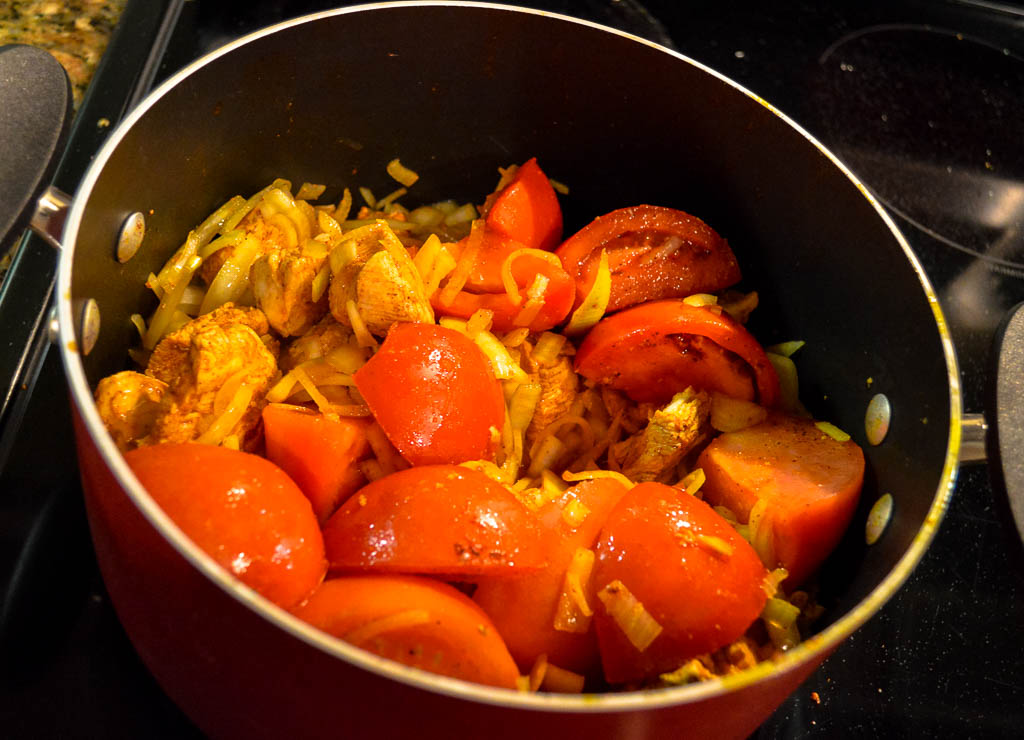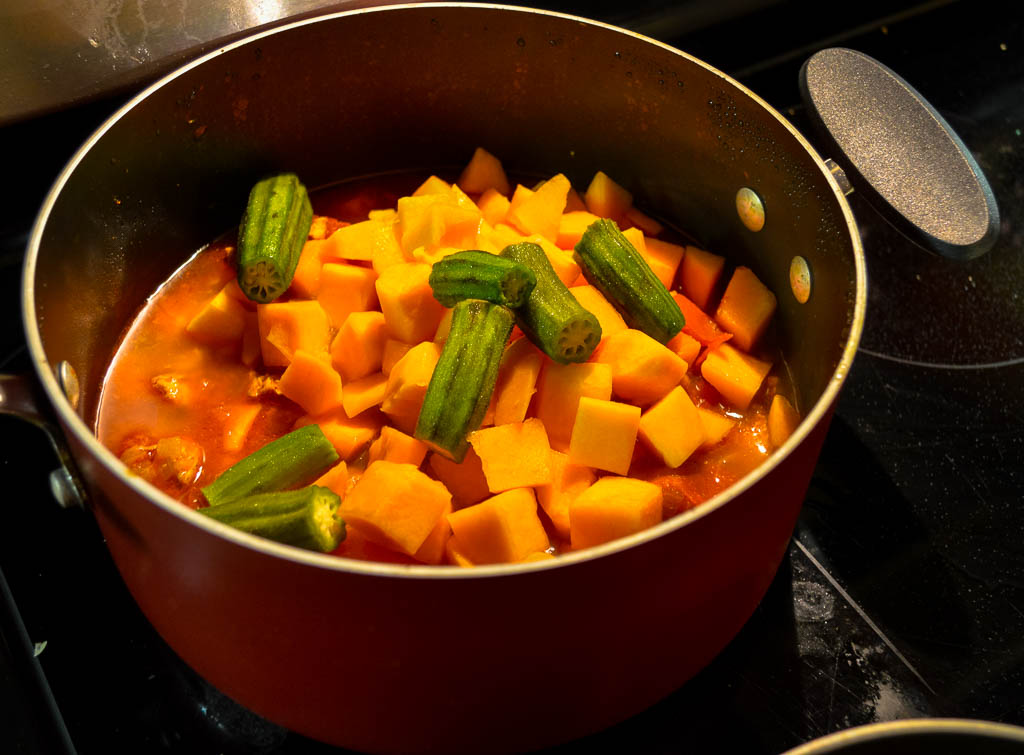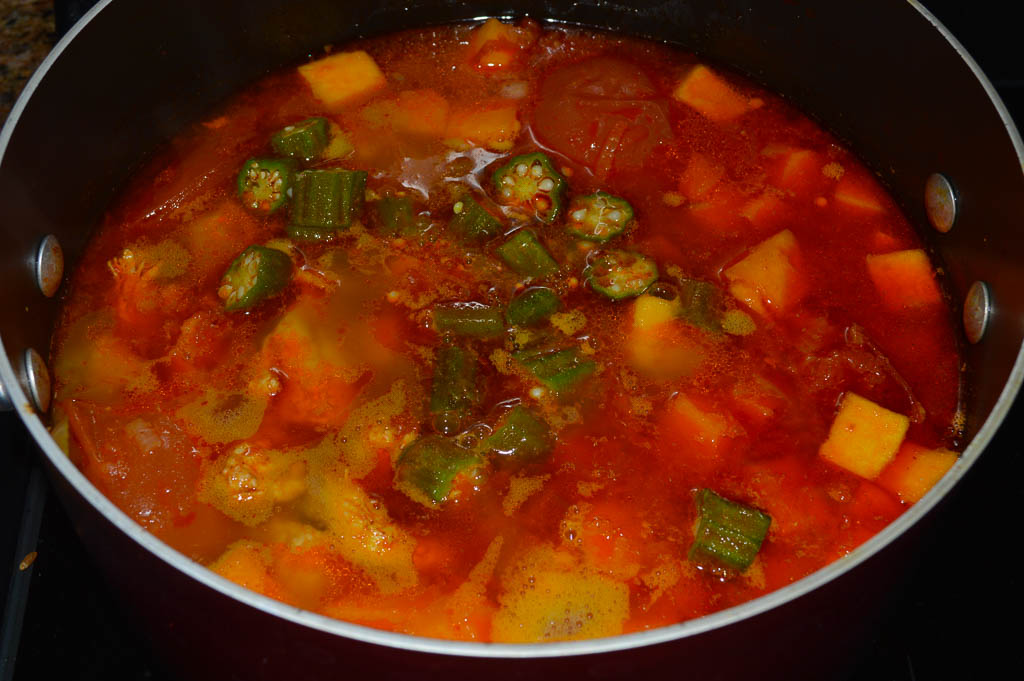EAT THE WORLD: ANGOLA
the angolan flag and my friend ulika. His friend and talented photographer notflavio took this picture. NOTFLAVIO IS ALSO THE CURATOR OF VIEWS OF ANGOLA, A FANTASTIC INSTAGRAM COLLECTION FROM ANGOLA
Cook the National Dish of Angola: Muamba de Galinha
Angola is our seventh stop on our EAT THE WORLD challenge. I can't believe we've managed seven countries! This is the perfect way to experience the world when you can't travel. Every challenge we learn something new about each country, eat a delicious meal, and watch a movie from that country. After South Africa's Eat the World, Angola is our second African country!
Angola is a country in southern Africa, bordered by Namibia, Zambia, and the DRC and has a history of colonialism, much like the rest of Africa. The region that is now Angola was first visited by the Portuguese, who initially used it as a strategic base for it's trade routes. Later, it became a massive site for slavery, with thousands of Angolans forcibly transported across the Atlantic to the Americas.
Even after the abolishment of slavery in the late 1800s, Angola continued to be marked by clashes, revolt and violence well into the 21st century. Angola formally gained independence from Portugal in 1975, but a bitter and bloody civil war ensued. This war lasted until 2002, and had a profound effect on the country and it's people. The last decade has seen Angola trying to come to terms with the massive humanitarian crisis the country faces, including displacement, land mines, child soldiers and other profound societal issues. The war had a traumatic impact on the country and the UN estimates that over 70,000 people are amputees as a result of land mines. Much of the last decade has been spent rebuilding the nation's economy and society.
With the scars of the last several centuries, Angola remains an unknown country for tourism. Few tourists travel to Angola, except for the truly adventurous, which it such a pity. The country boasts beautiful landscapes, waterfalls, mountains and beaches. The people are warm and welcoming, and have a great love of sports and dance. Angolans also love their food! Clearly there are many Portuguese influences in the cuisine too and we opted to cook one of the national dishes called Muamba de Galinha, a chicken stew. A couple years ago I made a friend from Angola in the States, Ulika. The photo above is a picture of him and the Angolan flag, taken by the talented NOTFLAVIO, a fantastic photographer who you check out on his Instagram. Instagram is my social media of choice to find talented and incredible photographers, and NOTLFAVIO also curates VIEWS OF ANGOLA account - an Instagram feed that shows some of the most beautiful pictures of Angola. Upon deciding our meal for Angola, I checked in with Ulika and he told me this is definitely a good one to make! He recommended to make it with funge, a staple in Angola, made with corn meal. Unfortunately, we didn't end up getting to that, as much as I wanted to. Instead, we paired the meal with some rice.
The Traveling Ginger is a participant in the Amazon Services LLC Associates Program, an affiliate advertising program designed to provide a means for us to earn fees by linking to Amazon.com and affiliated sites. There may be other affiliate links for other products and services on this page and throughout the site. These affiliations allow me to earn a small commission or compensation if you click the link and make a purchase through me. I only promote products, services, companies and experiences that I genuinely believe in and approve of.
Recipe for Muamba de Galinha
Ingredients
3 tablespoons lemon juice
4 garlic cloves, crushed
1/2 teaspoon salt
1 1/2 teaspoons chili powder
1 chicken quartered (or three chicken breasts cut up in chunks)
1/2 cup red palm oil
3 onions chopped
1 chili pepper
3 tomatoes quartered
1 lb butternut squash
1 cup chicken broth
1/2 lb okra
Directions
Combine lemon juice, 2 garlic cloves, salt and chili powder and rub all over the chicken. Let the chicken marinate for 1 hour at least. You can also let it marinate overnight.
Heat palm oil over medium heat, and brown the chicken.
Add the onion, remainder of the garlic, the whole chili pepper, and tomatoes.
Bring to a boil, cover and then reduce heat, letting it simmer until the chicken is tender - around 1 hour.
After the hour, add squash, chicken broth and okra. Cook until the vegetables are tender, usually 15 minutes or so.
Serve with rice
The Traveling Ginger Verdict:
As per usual, I stuffed up. You knew that was coming right?
I forgot the chili pepper and half the palm oil, because I'd read that the palm oil is a very strong taste and its better to use half the specified amount. So I feel like I didn't do it properly. Anyway! I did really enjoy this recipe. It used so many fresh ingredients, and I really loved adding so many veggies to this fun, interesting stew. It was also an easy meal to make. You're supposed to use a whole chicken, but if you know me really well, like say my poor mom, you would know that I HATE cooking chicken myself. I also have a hard time even eating chicken. It has to be cut up or I won't eat it, unless its on a burger. I don't know why... So there was no way I was going to buy a chicken and cut it up. I went to Whole Foods and got someone else to cut up chicken breasts for me. So don't do it my way! Try do it the authentic real way.
I really enjoyed cooking this recipe, but it wasn't one of my favorite meals we've made. It was yummy, but I think cooking chicken really puts me off sometimes, and I'm not the biggest fan of stews.
Movie Paring: O Herói
O Herói is one of the first films to emerge out of Angola. A joint production with Portugal and France, the film, while simple in plot, depicts the struggles of the people of Angola, coming back from two decades of Civil War. It follows several characters lives in Luanda, post-Civil War, and their attempts to adjust in a country that is also trying to heal. Vitório, one of the central characters, is returning to the capital as an amputee as a result of a land mine explosion. Manu, a young boy, searches for his father who left in the Civil War when he was a baby. While the story seems slow and uncomplicated, it touches on the nuances of adjusting and living in a society that is ravaged by a long, bloody Civil War, and I think that is where its excellence lies. If you're wanting a thrilling movie, this is not your pick. But if you are wanting to learn more about Angola, and the aftermath of living in a society torn apart, this is a good movie to watch. It did win a Sundance Award, and I think it is exactly because it simply depicts some of the problems of assimilating to life post-Civil War.
I guess you could say this EAT THE WORLD post was a lot heavier and educational then my usual ones. Why? I think because it touched a cord with me. I found little tourism information about Angola, but the history of the nation is important. I think it's also important to learn about other nations, not just their food and cool spots to visit, but the history and culture that defines lives there. Angola continues to adapt and grow from its history, and I'm glad that I was able to educate myself on a country that I thought I knew about, but really didn't.
It's also important to be reflective of how your life is different to another's, and how many of the things you take for granted, are huge blessings and privileges to others. I think in current times this sentiment is being lost quickly as a result of fear and intolerance, and we need to remember that many of us living in the Western World are incredibly blessed and lucky. While we sit in this point of privilege, we should strive to have empathy and understanding for others less fortunate or in need - not just Angola, but the rest of the world too. After all, we are ALL humans, just trying to make it in this big scary crazy messed up world.




















